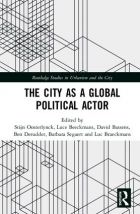The City as a Global Political Actor

The City as a Global Political Actor develops a nuanced and contextualized understanding of global urban political agency and its contribution to answering the question of how cities (can) act politically on the global scale. This book enriches a burgeoning scholarly debate brought on by a recent proliferation of pro-urban literature, epitomized by Benjamin Barber’s If Mayors Ruled the World. In Chapter 4, Gilles Pinson outlines some of the underlying assumptions of this literature, providing context to the debate. He argues that pro-urban literature is embedded within the spatialized societal debate or “cultural war” between the metropolitan modernist left and the conservative suburbs, small towns and rural areas. Moreover, within this literature, cities are spaces favoured by not just global capitalism, but also emerging national and international political actors, pushing forward their identities, agendas and interests. From this perspective, Pinson proceeds to provide an internal critique of the urban political agency thesis, focusing on “the relationship between the rise of cities as political actors on one hand, and the fate of territorial states on the other” (page 61).
By embedding global urban political agency within urban studies, the contributions to the volume speak to its overall objective of contextualizing, pluralizing and geographically expanding the analysis of urban political agency. The book argues for the need to supplement the scholarship on global urban political agency from the political science and international relations disciplines with insights from urban studies to develop a more pluralistic understanding of the notion. Briefly, these three urban studies insights emerging from the book’s chapters are defined by the book’s editors as follows (Chapter 1):
1) Contextualizing urban agency in time and space. This implies being sensitive to the path-dependency of socially produced urban agency. This means theorizing urban agency through space, thereby reflecting on the preferential attachment of political processes to the urban as a site of innovation and mobilization, but also analysing how agency operates across multiple spatial scales and in and through networks and territories.
2) Pluralizing urban agency by seeing it as socially produced, i.e. as nurtured through and emerging from the forging of coalitions of public and private actors, each of which bring relevant resources to develop the collective capacity to act. Urban agency, then, is not just a matter of mayors and city governments.
3) Expanding geographically our understanding of how urban agency can make a difference on the global scale, which requires us to look beyond global cities and draw on a diversity of contexts.
This volume is part of the Routledge Studies in Urbanism and the City series. It is organized into two sections. The first section deals with theoretical and conceptual underpinnings of the notion of global urban political agency from various disciplinary perspectives, including cultural philosophy, sociology, human geography and political science. The second section comprises several empirical analyses of cases of global urban political agency from around the world, with case studies drawn from cities within the EU and C40 network, South Africa (Johannesburg and Cape Town) and Eastern Europe (Budapest and Belgrade).
Book note prepared by Kate Goh
Search the Book notes database
Our Book notes database contains details and summaries of all the publications included in Book notes since 1993 - with details on how to obtain/download.
Use the search form above, or visit the Book notes landing page for more options and latest content.
For a searchable database for papers in Environment and Urbanization, go to http://eau.sagepub.com/

